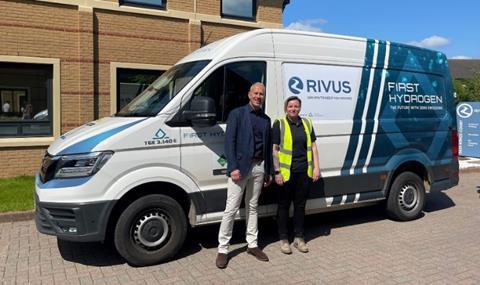
A four-week trial of First Hydrogen’s fuel cell electric van by fleet management firm Rivus has concluded that the vehicle has “unbeatable range” compared to other electric vehicles, covering over 300 miles per tank.
However the trial also found that the fuel cell electric vehicle (FCEV) is 36% more expensive to run than its diesel equivalent and almost twice as expensive to operate as a comparative battery electric -powered vehicle (BEV).
Fuel costs per mile for First Hydrogen’s FCEV amounted to 31p per mile, compared to 22p per mile for the diesel equivalent and 18p for a similar sized battery electric vehicle (BEV).
However the report acknowledges that those costs are set to fall below the cost of diesel by 2030, pointing to an analysis by the Hydrogen UK Transport Working Group, which predicts fuel costs are expected to decrease to £7.47 per kg by 2025 and as low as £4.09/kg by the end of the decade, which in the case of First Hydrogen’s vehicle equates to a cost of 13.7p per mile.
The report on the trial added: “This reduction, in combination with an increase in diesel prices due to associated CO2 emissions and the shrinking number of diesel vehicles on the road, will lead to cost parity with hydrogen at some point.”
The four-week trial of First Hydrogen’s FCEV saw Rivus engineers cover over 700 miles of testing, totalling over 47 hours of driving.
Tests were completed on diverse routes involving urban city centre driving, navigating extra urban routes, and driving combined routes, including a mix of low-speed city centre roads, higher speed roads and motorways.
Read more
- Road trial of First Hydrogen LCV launches with Rivus in Birmingham
- First Hydrogen chooses fleet manager Rivus to test its zero-emission van on public roads
- Rivus Fleet Solutions invests in “flagship” HGV-compatible garage featuring conference facilities
Rivus also tested the van both empty and loaded to 90% of its maximum weight capacity, to reflect the way vans are used in the real world and to give a more realistic indication of performance.
Trial analysis reveals that the van achieved 500km (311 miles) on a 10.3kg tank of hydrogen, which the report concluded makes hydrogen power a viable option for fleet operators that cover a high mileage and may not have the opportunity to re-charge a battery.
The report said: “It’s impressive to see a zero-emission vehicle with such robust performance, and therefore a wider range of use cases.”
Gemma Horne, Rivus warranty controller, took part in the trials and best described the overall experience as “brilliant”. She added: “The main benefit I see is that it takes less than five minutes to refuel, meaning the refuelling times are quicker than BEV charging times.
“Of course, unlike internal combustion engines, hydrogen vehicles produce zero emissions. The vehicle was very comfortable to drive. If this was my daily work vehicle, I would be happy with that.”
However, she noted that there were some issues with refuelling which need to be tackled. She explained: “First Hydrogen’s LCV tanks are much larger than those in a car. The refuelling station often cuts off as it is not used to delivering a large volume of hydrogen. We will feedback to the refuelling stations with this critical piece of feedback.”
Steve Gill, First Hydrogen’s automotive chief executive, said: “We are delighted that Rivus has managed to prove that this technology can be a viable option for many fleets.
“The trial also showed that the vehicle ran with excellent efficiency, comfortably achieving more than a 500km range on a single tank of fuel, exceeding the early performance expectations we set for real world driving.
“We have always been confident that our vehicle will offer benefits to fleets, and this first trial is evidence of just that.”












![First Hydrogen FCEV on track at MIRA[70075]](https://d2cohhpa0jt4tw.cloudfront.net/Pictures/100x67/7/1/0/16710_firsthydrogenfcevontrackatmira70075_947582.jpg)

